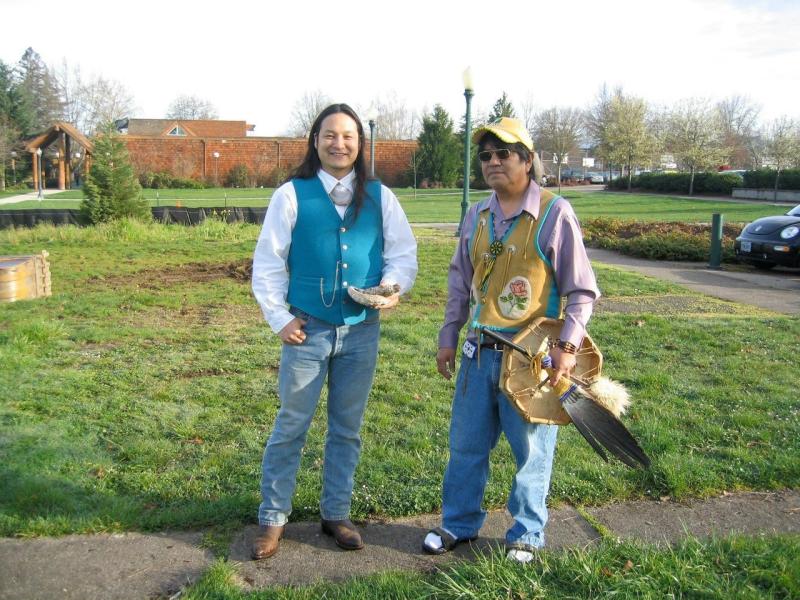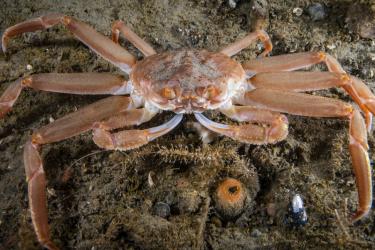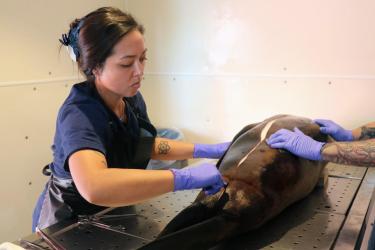Community and industry relations has long been a priority for NOAAâs Office of Law Enforcement. Communicating with stakeholders and tribal communities builds relationships that are invaluable to good stewardship and protection of marine resources. So when NOAA Enforcement Officer Mitchel Kiyotakitsune received a special invitation to attend the Oregon State Universityâs Salmon Bake, he made sure to be available.
For 20 years, OSUâs Native American Longhouse Eena Haws has hosted this annual event as an opportunity for students to learn about treaty and fishing rights in the Pacific Northwest, work with some of the local tribes and tribal fishermen, and eat foods prepared in the tradition-rich tribal way. This was the first time NOAA Enforcement had been invited. Kiyotakitsune explained that he believes the invitation was extended to him because heâs a former faculty member of the college who taught Native American studies.
âMy attendance at this event was significant on many levels,â he said. âI am a Native community member, who happens to also be a federal law enforcement officer. I understand the nuances of Native relationships, traditions, and challenges, while at the same time understand the magnitude of the NOAA mission. So Iâm able to represent law enforcement with a familiar face and communicate in a way that everyone can understand.â
Kiyotakitsune explained that itâs unusual to see enforcement personnel at a Native community event. Historically, Native communities havenât had the best relationship with enforcement agencies, especially the federal government. He explained that when he first arrived at the event, people were concerned that he was there because they were doing something wrong or he was looking for someone.

âI think it was a shock to see a person in body armor, with a gun on his hip and âFederal Officerâ on his back, show up at a Native community event,â he said. âSo there was a bit of apprehension when I told them that I was just there to volunteer.â
At first, Kiyotakitsune moved cinder blocks to set up a fire pit. Then, when the cooks began to prepare the salmon, Kiyotakitsune jumped in to help. He used traditional cooking methods he learned from local Klamath elders (âwisdom keepersâ of the tribal community), securing the salmon to cedar stakes, and assisted the tribal cook and students each step along the way.
âAttending an event like this requires a relationship with the people,â said Kiyotakitsune. âEven though people there didnât know the relationship was already established, I knew that it would be seen by the end of the dayâand it was.
âIn my culture, it is not appropriate to brag about yourself and you donât bring up stories that could seem like youâre boasting, either. So when my former doctoral student showed up and began telling stories about my background, community standing, and family, people started treating me like family.â
He said that some of the tribal fishermen in attendance knew his extended family and spoke about fishing together on the Columbia River. Kiyotakitsune said that a commonly asked question was why he joined the federal enforcement agency. He explained that NOAA Enforcement and tribal communities have common interests.
âNative people have a sacred responsibility to steward the Earth and environment. This job is one of the few places in the federal government where I can fulfill that responsibility,â he said. âItâs an honor and privilege to serve and embrace my cultural traditions.â
As the day went on, Kiyotakitsune said that more students and attendees engaged in conversation with him. They asked questions about marine resource policies and regulations, and showed interest in understanding more about what is legal and why.
âRepresenting NOAAâs enforcement office at indigenous community events is advantageous to our mission,â Kiyotakitsune said. âThe more that people understand what we do and why, the better able we are to collectively protect our marine resources. Itâs also important for people to understand that enforcement officers are part of the community. We come from all walks of life, and you can serve in uniform while also upholding your traditional values.â
Story by Ally Rogers, communications officer for NOAAâs Office of Law Enforcement. To contact her, please call 301-427-8255 or email allyson.rogers@noaa.gov.



